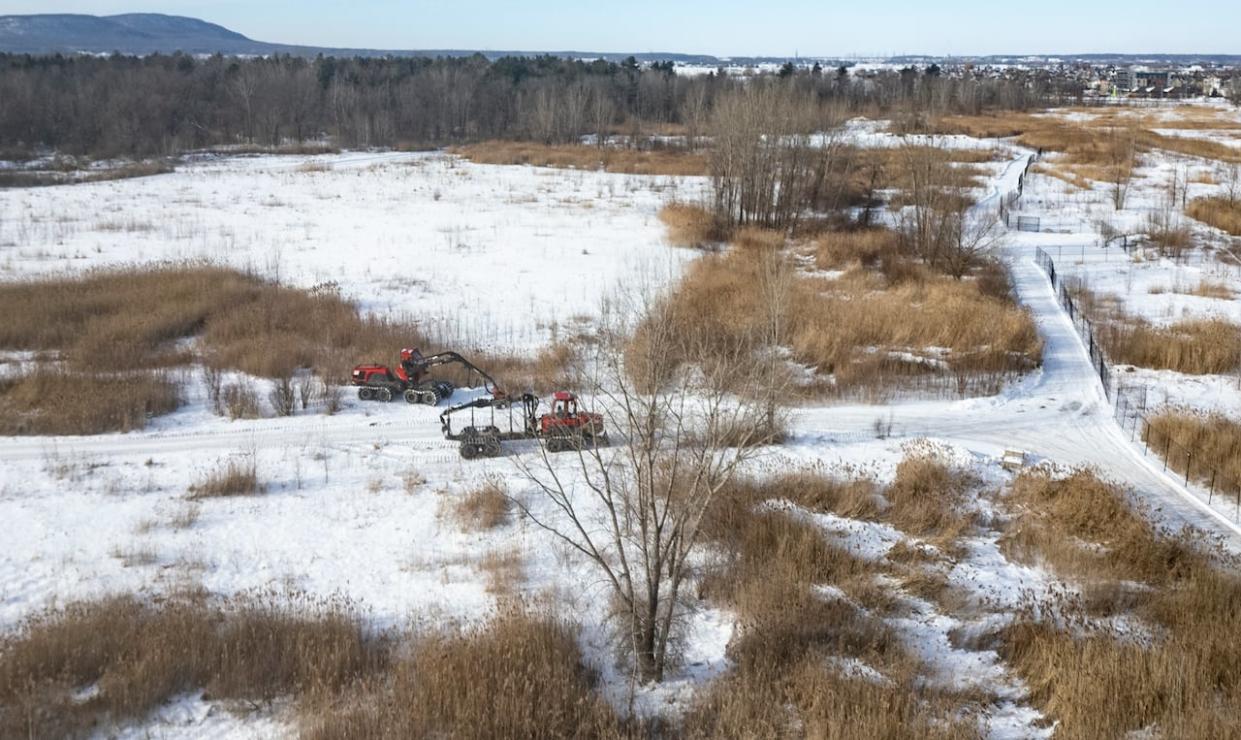Environmental group asks court to suspend work at Northvolt EV battery plant

Lawyers for an environmental group on Wednesday urged a Quebec Superior Court judge to suspend the construction of an EV battery factory east of Montreal.
The group, the Centre québécois du droit de l'environnement (CQDE), argued the city of Saint-Basile-le-Grand lacked the authority to greenlight the cutting of wetland trees to make way for the Northvolt plant.
The group also says the Quebec government, which is also named in the injunction request, should have acted to protect environmentally important ecosystems that will be bulldozed to make way for the factory.
"It's clear now that significant public participation is key for large industrial projects," Marc Bishai, one of the group's lawyers, said.
"We want to make sure that people understand and are able to voice their concerns and ask questions to make sure that the democratic process is respected as much as possible."
When the plant was announced last year, Quebec Premier François Legault and Prime Minister Justin Trudeau lauded the multi-billion-dollar factory as a driver of economic growth and a step toward the complete production of electric car batteries in Canada.
Superior Court Judge David Collier questioned the validity of CQDE's argument. Bishai said a decision is not expected in the case until later this week or early next.

Marc Bishai is a lawyer with the Centre Québécois du droit de l'environnement. They are asking for a court to stop the construction of the Northvolt battery plant. (Sharon Yonan Reynold/CBC)
Stéphanie Caron, a lawyer representing the government of Quebec, said the ministry is going through the proper approval process for the Northvolt site.
When a company wants to do work in a wetland, it is up to the provincial Environment Ministry to decide whether that work can go ahead, Caron said.
In this case, Northvolt is following the law, Caron said, explaining that the company both agreed to pay financial compensation — required by law when doing work in wetlands — and has agreed to take several measures to mitigate the environmental impact of the plant.
"The ministry absolutely does not give a company carte blanche to do whatever it wants," she said.
The ministry will continue to evaluate and approve the next steps of the factory on its merits, she said.
Sabotage
Bishai said his group was unaffiliated with alleged sabotage at the Northvolt site.
An anonymous environmental group circulated a claim earlier this week that they had inserted metal bars and nails into trees at the site, which straddles the communities of McMasterville and Saint-Basile-le-Grand, on Montreal's South Shore.
"We immediately thought that this is probably a symptom of deep worry in certain parts of the population," Bishai said.
"Our organization … uses the law and goes before the courts to try to protect the environment and we will continue to do so."
Mohawk Council of Kahnawà:ke files lawsuit
The Mohawk Council of Kahnawà:ke (MCK) said in a media release on Tuesday that it was filing a lawsuit alleging that the Quebec and Canadian governments failed to adequately consult with the public and Indigenous communities before approving the initial phase of the Northvolt plant.
The MCK said it was also challenging the legislation that governs work in wetlands, arguing that the laws fail to "consider, let alone respect, Indigenous rights."
"The [Northvolt] site contains some of the highest quality wetlands in the region," the MCK media release said. "Wetlands are essential ecosystems, serving as critical habitat for fauna and flora, and providing multiple ecosystem services such as cleaning water, storing carbon, and retaining and redistributing water during major storm events, helping to prevent flooding."

